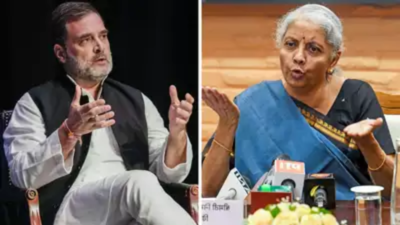
In a series of posts on social media platform X, Sitharaman refuted the opposition leader’s remarks, which were made during an attack on the government’s financial policies. She stressed that public sector banks have undergone substantial improvements, a stark contrast to the challenges they faced under prior administrations. These advancements, she argued, are attributable to structural reforms, technological upgrades, and proactive measures to ensure financial stability.
Sitharaman described Gandhi’s statements as a disservice to both the workforce of PSBs and their customers, who have benefited from enhanced services. She argued that such assertions undermine the credibility of a system now celebrated for its resilience and adaptability in the face of evolving challenges. The minister also highlighted how reforms introduced by the administration have positioned PSBs as significant contributors to India’s economic growth trajectory.
The opposition leader’s comments have reignited debates over the management and accountability of public financial institutions, a recurring topic in parliamentary and political discussions. While Gandhi accused the National Democratic Alliance (NDA) government of favoring select corporate entities at the expense of the public sector, Sitharaman presented data to counter these claims. According to the finance ministry, gross NPAs of PSBs, which had ballooned during the tenure of previous administrations, have seen a marked decline under the current government.
The finance minister credited the Insolvency and Bankruptcy Code (IBC), introduced during the NDA regime, for providing an effective mechanism to resolve stressed assets. She argued that this framework has not only aided in recovery but also dissuaded willful defaulters. The data supports her assertion, showing that PSBs have recovered significant amounts of bad loans in the past few years, signaling a healthier banking ecosystem.
Sitharaman also pointed to the infusion of digital tools in the banking sector, which has improved customer service, increased transparency, and minimized risks of fraud. Initiatives like the implementation of core banking systems and strengthened monitoring processes were cited as evidence of the government’s commitment to modernizing PSBs.
This clash between Gandhi and Sitharaman is not new; it reflects the larger ideological divide between the ruling party and the opposition on economic and financial matters. Gandhi’s criticism forms part of a broader narrative aimed at questioning the accountability of the government concerning public resources. In response, Sitharaman underscored the necessity of factual accuracy in public discourse, suggesting that the opposition leader’s claims lacked substantiation.
Observers note that this public exchange comes amid heightened scrutiny of the government’s handling of the financial sector. Analysts argue that the reforms introduced have yielded tangible benefits but caution that challenges such as global economic uncertainties and rising competition require continued vigilance. Critics of the government maintain that the benefits of these reforms have not been uniformly distributed and urge greater transparency in operations.
Sitharaman’s defense also extended to the broader achievements of the NDA government in fostering an inclusive banking ecosystem. She highlighted the success of the Pradhan Mantri Jan Dhan Yojana, which has brought millions of unbanked individuals into the financial fold, as well as schemes aimed at providing credit to small and medium enterprises. These initiatives, she asserted, have empowered various sections of society and supported economic resilience.
The finance minister’s rebuttal was met with divided reactions, with supporters lauding the detailed response and critics questioning its sufficiency in addressing broader concerns about financial mismanagement. Experts from the banking sector largely agree on the progress made in reducing NPAs and improving operational efficiencies but remain wary of challenges that persist, such as managing systemic risks and ensuring robust governance.
Rahul Gandhi’s remarks and Sitharaman’s counterarguments have also reignited discussions about the accountability of corporate borrowers and the role of public sector banks in supporting national economic goals. While Gandhi’s critique implied favoritism toward influential entities, Sitharaman emphasized that regulatory measures and vigilance have significantly curbed malpractices.
This exchange underscores the complexities of managing a sector as pivotal as banking, where public trust is integral, and political narratives often collide with operational realities. As India continues its pursuit of economic growth, the performance and policies of public sector banks remain central to broader financial stability and development.
